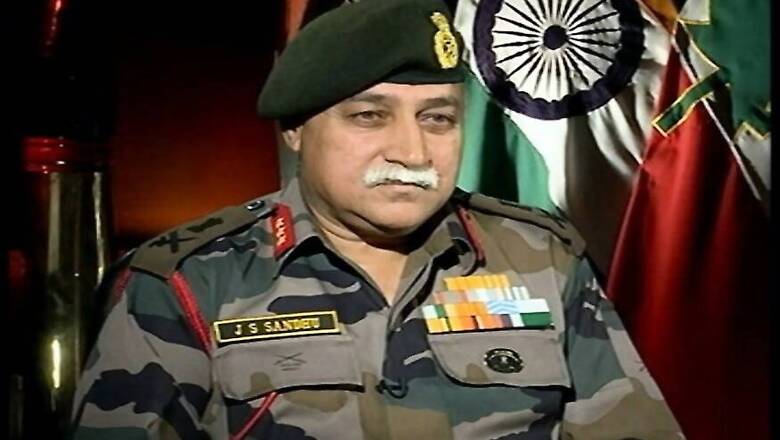
views
As the nation talks about Army rewarding Major Leetul Gogoi, who had tied a man to his jeep in the Valley, and the brutal murder of Lt Umar Fayyaz, Commander of the 15 Corps (Srinagar base) Lt Gen JS Sandhu tells CNN News18’s Shreya Dhoundial how the situation in the Valley has changed after the incidents and why he thinks the Valley is moving towards peace.
Q: Major Leetul Gogoi, an officer under your command, has been in the news lately. In the light of the recent turn of events, the Army has been seen backing him, despite criticism over his actions. Is that because you justify his act of tying a man to his jeep or is it that you’re just backing one of your own?
A: I think his actions were warranted. It is very easy for us to find fault, but if you put yourself in his shoes, he had very few options. Either he had to open fire, which would have resulted in more loss of lives and rise in violence, or he had to try and save his men of ITBP and also the J&K Police who were stuck at the police booth. The choice he made was the right one.
Q: There are many retired Army officers who are of the view that the image, of an Army jeep with a human tied to it, will haunt the forces for a long time. Do you agree?
A: Army is a vibrant, strong institution and the Indian Army is defined by many images, including those of soldiers climbing ice walls in Siachen, fighting for their lives, destroying bunkers across the LoC and helping people in times of a national calamity. As far as this image of a Jeep is concerned, one needs to understand there can be alternative solutions to every situation. And this image is of an alternative solution. The Army is too vast an organisation to get negated by an action of this nature.
Q: What about the fact that there are many who believe this was a gross violation of human rights of one man?
A: There are times when we have to act in a situation that we call the grey zone. That basically means we have to take a call on need for some flexibility, in terms of operation and action. This is what Major Gogoi has done. It’s not right for us to put everything in black and white. I don’t want to be a judge and rule on who the accused is and who isn’t. But I definitely have to see the circumstances under which my officer acted the way he did. As of now, all evidence is against the circumstances.
Q: There is a court of enquiry on this incident. Do you think the award to the Major could have waited?
A: The court of enquiry is almost over. The findings of it are known. Hence, there was no reason for us to delay the award.
Q: There are many who are saying that the Valley has gone back in time and the situation is as bad as it was in the 90s. What do you think is the biggest challenge for the Army? Is it terror input from Pakistan or is it militants here or is it stone pelters?
A: Everything you mentioned is a challenge, and these are what I would call anti-Indian forces or anti-national forces. There forces include terrorists, including those from Pakistan and within India. Then we have stone pelters, and those who support them, whom we call on ground workers (OGWs). It includes separatists, organisations and the support base is obviously backed by Pakistan and the terrorists. We are contesting all anti-India forces. We need to break their network. When that is diluted, terrorists and stone pelters will succumb eventually.
Q: There have been pictures of young children picking up stones. How do you deal with that?
A: The student protests started with an event which has been misinterpreted. It was just the shifting of a post in Pulwama which was done by J&K Police and CRPF. Yes, the shifting of the post resulted in some stone pelting, but the situation was not grave. But then, you have to understand there are people who fuel these incidents. But, I have to say it was handled well by the CRPF and the J&K Police. It’s not like the Army didn’t want to get involved, but it was largely contained by other security forces.
Q: Do you sense any radicalisation among the Kashmiris since Burhan Wani was killed? Do you think there is a political vacuum that is leading to the frustration?
A: There are indications of radicalisation, and they are primarily because of a lot of propagation of radical messages by anti-India forces, including international ones. Radical messages from Pakistan, Gulf countries are part of this. There are many who fund such radicalisation also. It is difficult to say how grave the situation is, but there are definite feelers that radicalisation is on the rise.
Q: Is it true that South Kahsmir has been the worst hit by this radicalisation?
A: Terror recruitment in South Kashmir did increase. Last year, many young people wanted to join terror groups. Some of them were dissuaded by their elders, but I can’t deny the fact that many did join. Even this year, there are many people who want to join. But I can also say that many have also realised that the future is bleak on that side of the spectrum.
Q: Political leaders of the country believe that things will die down in Kashmir over the next few years. Are you optimistic?
A: What we have gathered is that people, to a large extent, want peace. There are many people in Kashmir who have indicated that they don’t want this situation in the Valley to prolong. They don’t want to protest because it has hit their livelihood. So, yes, the situation should be peaceful soon.
Q: Squadron search operations are back in Kashmir after 15 years. What was the need?
A: What we have executed in the last couple of weeks is not similar to the operations that happened in the 90s. We are calling it a Clearance Search Operation, wherein we are largely going to areas where terrorists have gained a greater freedom of movement, where the support base has increased substantially. Our target is to move them out of their comfort zones and also make Army presence stronger in the area. The squadron search operations of the 90s was completely different.
Q: Have these operations been as successful as you expected them to be? There have been reports of stone pelting at forces as well.
A: Surprisingly, we had stone-pelting only in Turkwangam (near Shopian) in the first operation. That was it. We are not quantifying the success of this operation in terms of the number of terrorists killed or neutralised. The aim of this operation was restore peace back in the state and increase our presence, which we have achieved. We will continue to work on those lines.
Q: Did you, even for once, believe that the brutal murder of Lt Umar Fayyaz who was at home on leave to attend a wedding, could change the environment in Kashmir?
A: It may be too early to call it a turning point, but it most certainly was defining. How it will change the environment is yet to be seen, but it did result in anger among people who knew this was not acceptable. The interesting part is nobody owned up to the murder. Even a terrorist organisation like Hizbul Mujahideen, which generally is the first to take charge, didn’t say a word. These indicators of anger among people made them stay shut and question their own actions against Lt Umar Fayyaz. Many within Kahsmir started realizing if their actions were hurting their own. It’s definitely a time of realization for many, and we’re not ignoring the development.
Q: There are few Kashmiris in the Army. Do you think officer Fayyaz’s murder will deter people from joining?
A: I don’t think this will deter people from joining the Army. He has been an inspiration to many. He was a brilliant officer, an excellent sportsman and a role model to everyone who knew him. There are many who want to join the Army. They want better opportunities for themselves, their families. This desire for a better future will remain in the Valley and will encourage people to join the Army.
Q: What bothers you the most about his murder?
A: He was just 22 and had come home on leave to spend time with his family. He had no anger towards the people who killed him, and he was murdered in cold blood. Since you spoke to me about violation of human rights, this is what it looks like. And the rights were violated by a terrorist.
Q: Coming to the recent video that was released by the Army on punitive attacks on Pakistan Army posts. Is there a change in India’s strategy to tackle infiltration? Will we see more such strikes?
A: We are ready to undertake more such attacks. I cannot, however, comment on our strategy to counter infiltration.
Q: Pakistan has denied any such happening and called the video fake. How do you respond to that?
A: This is expected because they need something to appease their countrymen. We all know Pakistani forces indulge in falsehood.

















Comments
0 comment